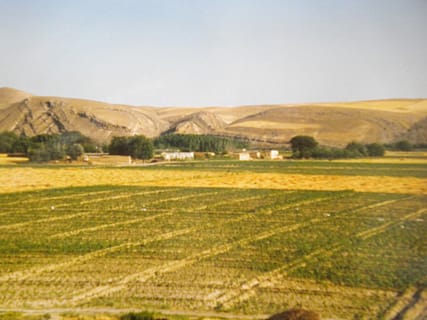The mud brick walls of the compound emit a faint heat through the soft mellow warmth of the evening. I lean my hand on the wall’s rough surface and watch the lights of the tractor in the field below moving between rows of corn.
Beyond the fields lies the Euphrates River; the jebels on the other side are silhouetted against the remaining pale glow of the sun. I spit minty foam into the rubbish which cascades down the tell outside our compound; the heat has bleached it clear of its odour. Dust fills my nostrils instead.
We came to Tell Ahmar this morning in a yellow servees taxi. We trundled through the streets of Aleppo, passing road side fresh fruit and vegetable stalls and fruit set out to dry on vast stretches of fabric and tarpaulin. Apartment buildings in dusty outer suburbs gave way to farmland, dotted with olive and orange trees. The plastered houses looked cool and clean.
The arable land became dryer and dustier and corn and cotton replaced fruit trees and mud brick ‘beehive’ villages appeared. Farmers, young men and old men in gallabiyahs, their wives and daughters in bright patterned dresses and scarves, dots of colour on the landscape.
Then suddenly we were in the desert, a pale, pebbly, flat land stretches to the horizon. Small boys encouraged flocks of fat-tailed sheep onwards in search of elusive grassy snacks.
It seems inhabited, uninhabitable, but Bedouin men appeared on the roadside as if from nowhere, dressed in white gallabiyahs, red head scarves and suit coats. They alight from buses and head straight into the desert.
On the far distant horizon, the low range of hills grew closer. We passed between them and suddenly the river is there, the Euphrates, wide and dark. We crossed the bridge guarded on each side by bored young men sitting on mattress-less beds with guns slung over their shoulders.

We drove up a little way up the valley, green with corn and cotton. Men waved to us from their tractors. Others looked up from their work and smile.
The taxi turned off the main road onto the unmade track leading through the village to our compound. We peeled ourselves from the taxi’s upholstery and stretched our cramped legs. Small children chased us to but stop at the gate or seated themselves on the boat lying just inside, watching us with shrieks of laughter, these strange foreign people.
For we are strange; the circus has indeed come to town.
Men’s voices shout their goodnights and a motorcycle fires up. The generator thuds, the cow tethered next to our compound moos in a rather desperate sort of way; the donkeys bray their replies. A man climbs onto the roof of his mud brick house and adjusts the TV antenna. Voices murmur around the compound as my colleagues prepare for sleep. The stars stretch over the valley.
It seems surreal to me that people have lived here for such an incomprehensibly long time.
The cow falls silent, the tractor is heading home. I rinse my mouth and head back to my room.